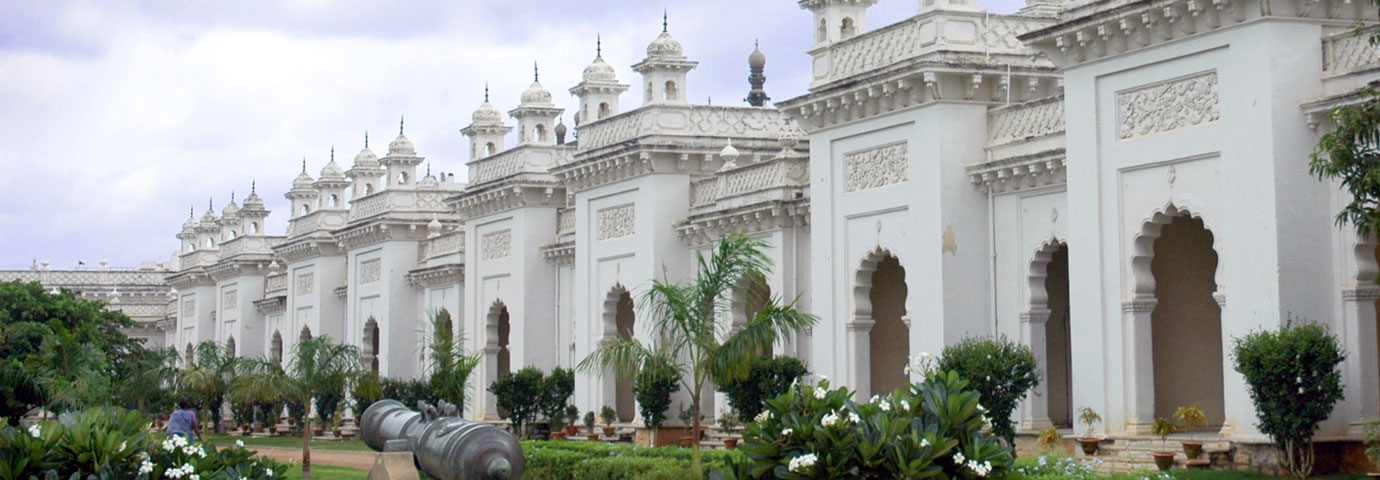
| Opening Time | 10:00 AM to 05:00 pm (Closed on Fridays and National Holidays) |
| Entry Fees |
INR 40 (Indians) |
| Location | Khilwat, Moti Gali, Near Laad Baazar |
The former centre of the ‘City of Nizams’, Hyderabad, the splendid Chowmahalla Palace was the seat of the rulers of the Asaf Jahi dynasty. This palace became the venue where the Nizams used to entertain their important guests and special visitors and organize ceremonial ceremonies. Erected around 200 years ago, Chowmahalla Palace boasts of exquisite architecture and magnificence. The complex of the palace is a combination of a number of architectural styles.
Today, Chowmahalla Palace is a heritage property of Hyderabad that is known for its unmatchable interiors as well as exteriors. It is believed that this palace is a carbon copy of the palace in Tehran that belonged to the Shah of Iran. In the year 2010, this architectural masterpiece received Asia Pacific Merit award for a site being that conserved cultural heritage of the region. The palace, in the present times, is available for a few corporate people and individuals to host important events, musical evenings and special dinners.
The construction of Chowmahalla Palace started in the year 1790 by Nizam Salabat Jung and was completed between 1857 and 1869 during the reign of 5th Nizam, Afzar-ud-Daulah, Asaf Jav V. It is believed the model of this palace is replica of Shah of Iran's palace, located in Tehran. The palace complex was renovated recently.
Chowmahalla Palace spreads in an area of 45 acres, extending from the Laad Bazaar in the north to the Aspan Chowk Road in the south. Today the palace stands over an area of 12 acres. The palaces’ constructed began in 1750 and was completed in the year 1869. It is a synthesis of Rajasthani, European, Persian and Indo-Sarcenic architectural styles. It is divided into northern and southern courtyards, beautified by beautiful gardens and fountains. Each part of this palace has delicate designs exuding Nawabi charm.
Northern Courtyard
This part has the Bara Imam, with a number of rooms, lining a long corridor, which faces the pool and the eastern side of the central fountain. This used to be the administrative wing of the palace. This structure has striking Mughal domes and other elements of Persian architecture such as ornamental stucco work that decorates Khilwat Mubarak. Right opposite this structure, there is Shishe Alat. The rooms here were used guest rooms for special guest
Right in the center of Chowmahalla Palace is Khilwat Mubarak, the seat of the rulers of Asaf Jahi dynasty. This structure has the huge Durbar Hall with impressive pillars. This hall has a marble platform where Takht-e-Nishan or the Royal Seat was placed. It was the hall in which the Nizams used to organize their court and other important ceremonies. The most recent addition here are the 19 stunning Chandeliers of Belgian crystal.
The visitors are welcomed by The Clock Tower, right above the main gate of the palace. It is Khilwat Clock. The clock in this tower has been ticking for around 250 years. Every week, an expert winds the mechanical clock.
There is another building, the Council hall that has a collection of historic manuscripts and rare books. The collection also consists of royal buggies, crockery, vintage cars, furniture and crockery belonging to the times of Nizams. Temporary exhibitions are organized here from time to time.
This is another beautiful structure here. It is believed that the 6th Nizam lived here. It is named after his mother, Roshan Begum.
Built in neo-classical style, southern part is the oldest part of the palace and comprises of 4 palaces- Aftab Mahal, Afzal Mahal, Tahniyat Mahal and Mahtab Mahal.
The latest addition to Chowmahalla Palace was Heritage Library that has over 10,000 books including the personal collection of the Nizams including VII Nizam Mir Osman Ali Khan and VI Nizam Mir Mahbub Ali Khan. This library has a vintage décor, revamped furniture, portraits and paintings that originally belonged to the rulers of the region. The manuscripts are in various languages including Urdu, English, Persian and Arabic. Century-old books are about medicine, geography, history, poetry, Islamic culture, law and literature.
Subscribe Our Newsletter for get latest updates
Follow us: